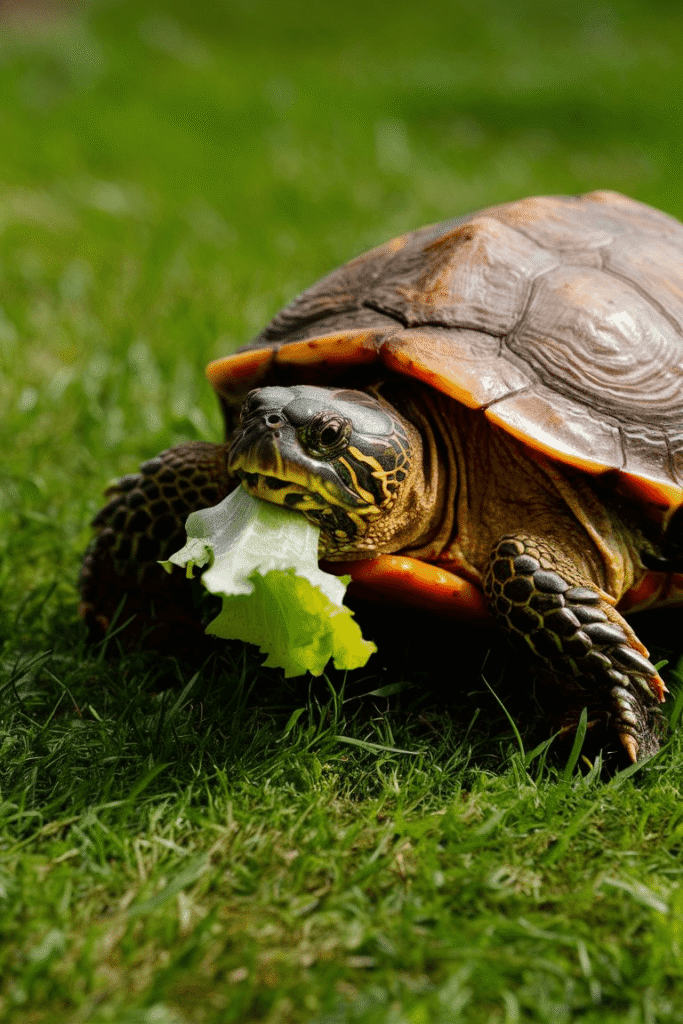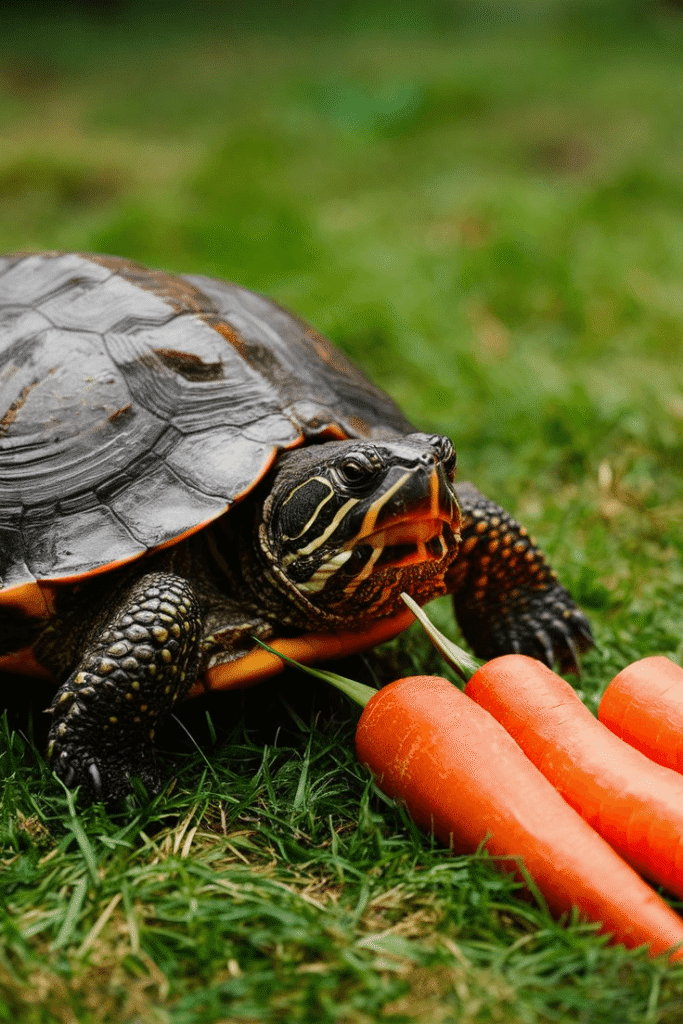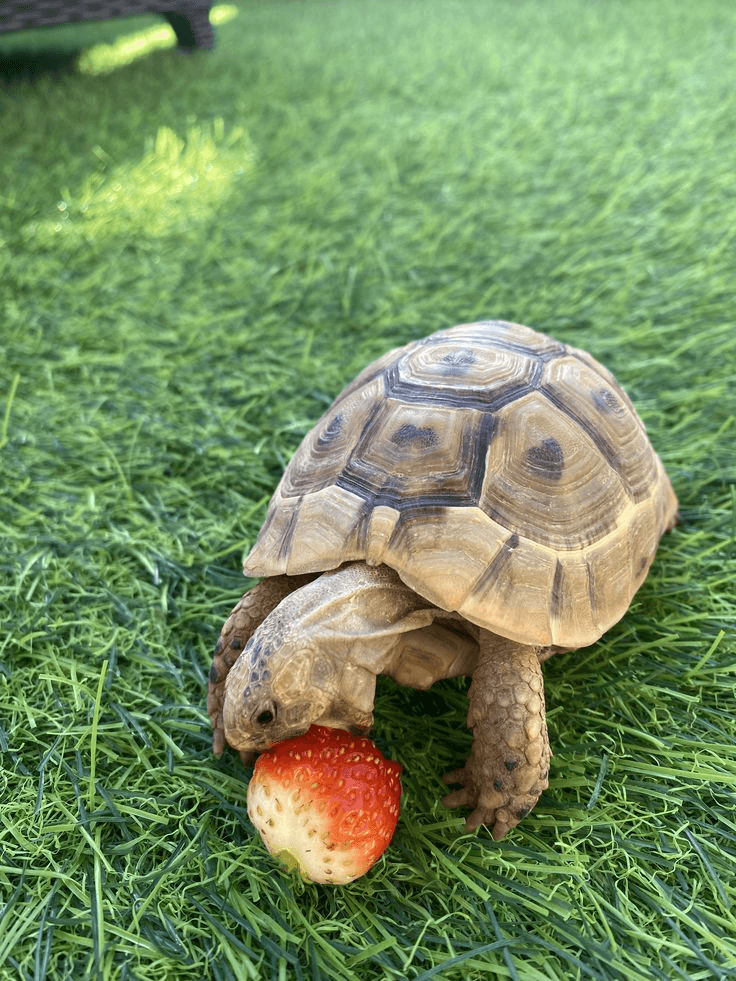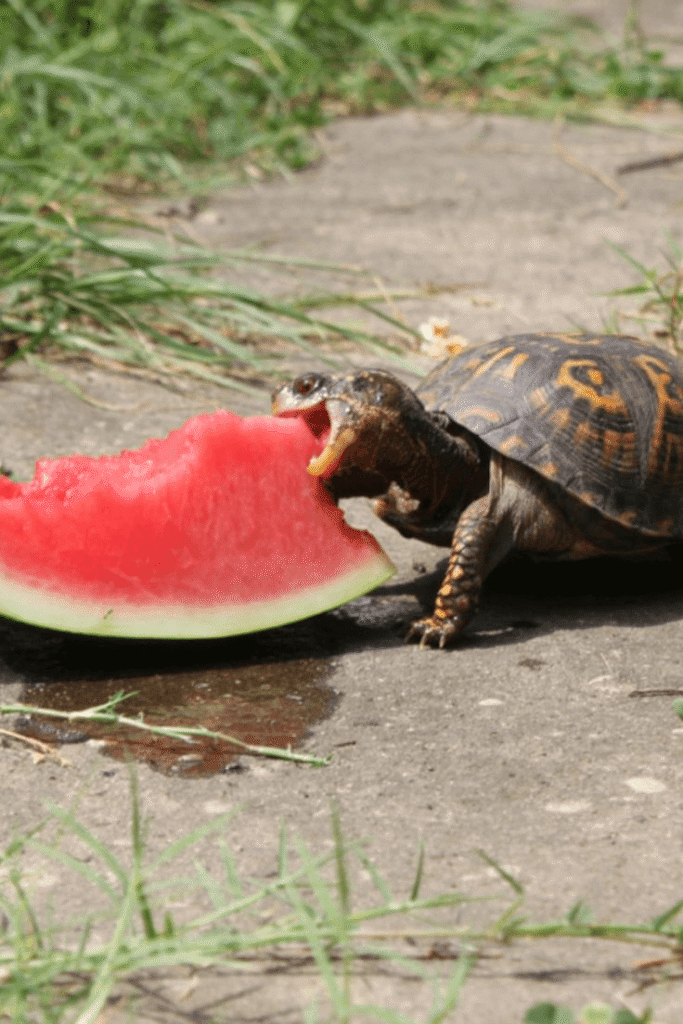Introduction Can Turtles Eat Human Food?
Can Turtles Eat Human Food? Over the years, I’ve seen many new turtle keepers get tempted to share chocolate, pizza, or even fried foods as if these reptiles could handle the same menu as humans. The truth is, offering processed foods, salty snacks, or seasoned meats often leads to digestive issues and even slow forms of poisoning.
Turtles are highly sensitive to fat and sugar, and their systems are not designed to handle dairy or bread. These may appear harmless but can prove deeply harmful in the long run. From a nutritional standpoint, these choices have almost no positive value and instead increase the risk of hidden damage. Many beginners don’t notice until their pet develops health complications.
I’ve personally dealt with cases where overfeeding raw meat or random leftovers brought sudden illness. These experiences show just how dangerous human indulgences can be for turtles.
On the other hand, there are a few safe allowances if handled with moderation. Small pieces of fruits such as strawberries, apples, or watermelon, alongside hydrating options like lettuce or cucumber, can act as occasional treats.
Since turtles thrive on natural, plant-based elements, these choices mirror some aspects of their wild instincts without putting their system at risk. However, even these must never replace their main diet of commercial pellets, leafy greens, and reliable protein sources like insects or fish.
Maintaining balance with natural foods ensures a proper diet and avoids the trap of using human snacks as regular turtle meals. The reality is, turtles forage on aquatic plants, worms, snails, and their diet varies by species. Sticking close to those instincts is the key to avoiding malnutrition, shell deformities, digestive blockages, and other long-term health issues.

Foods Turtles Should Never Eat / Dangerous Human Foods
I have seen many new owners assume that because turtles sometimes nibble on plants or even small insects in the wild, they can casually share parts of their own meals. In practice, offering bread, dairy, or salty and processed items creates hidden dangers that lead to severe health problems. A turtle’s species and age dictate very specific dietary needs, and when those are replaced with human snacks instead of recommended or specialized nutrition, the long-term impact can manifest as malnutrition, shell deformities, and even digestive blockages. I once met a keeper who thought occasional breadcrumbs were harmless; months later, the turtle developed noticeable growth irregularities that were difficult to reverse.
What is especially overlooked is how small amounts of meat, especially cooked, seasoned, or even fried portions, can quickly become harmful. Unlike natural proteins gained from worms, fish, or snails, human-style food alters digestion and leads to compounded health issues. Even items considered “light” like certain fruits, including bananas or heavily sweetened snacks, push sugar levels beyond safe tolerance. Such feeding may seem like treats, but these are not part of a turtle’s proper nutrition. When compared with carefully balanced commercial pellets, fresh vegetables, or leafy greens, the dangers of human food become clearer, what feels like kindness is, in truth, an invitation to long-term illness.
Safe Foods (Limited Human Options)
When people ask me about offering human foods to turtles, I usually start with an unusual angle: instead of focusing on what’s “allowed,” I highlight how their dietary needs are already met through specialized nutrition like commercial pellets, leafy greens, and even protein sources such as insects or small fish.
Yet, in rare circumstances, carefully chosen fruits like apples or bananas in strict moderation can be considered safe. I’ve personally seen owners offer these as occasional snacks without triggering major health problems when kept far from becoming a staple.
What surprised me early in my own practice was how some species, depending on their age and whether they were raised in wild-inspired enclosures with plants and natural meals, handled such introductions differently.
It is also essential to point out that while certain natural vegetables or live protein resemble what they might forage in nature—like worms, snails, and aquatic plants—the overlap with cooked or processed items from our kitchen is minimal.
Even something as common as bread or dairy, which might seem harmless, often leads to upset digestion or more serious long-term health issues like malnutrition, digestive blockages, or even subtle shell deformities.
From a practical standpoint, the key is to rely on a proper diet that emphasizes a balance of natural foods and commercial food, keeping any meat or raw options within their ecological context.
In my observation, the safest path is to avoid blurred lines with cooked, seasoned, or fried meals altogether, ensuring the nutrition provided remains aligned with what evolution has prepared turtles to handle.

Balanced Diet for Turtles
When shaping a truly balanced diet for turtles, I’ve learned that it isn’t about tossing random fruits or leafy greens into the enclosure—it’s about aligning their dietary needs with what different species would naturally forage in the wild. In practice, this means combining aquatic plants, worms, insects, and even small fish with carefully measured portions of commercial food or pellets. Too often, owners make the mistake of leaning on human meals like bread, dairy, or processed items, which may cause digestive issues, malnutrition, or even shell deformities. My personal experience taught me that a turtle thrives when its nutrition blends both plants and live protein, not when it’s treated to sugary treats or overly seasoned meats.
From an expert’s perspective, structuring meals requires attention to age and species. A younger turtle has higher protein demands, while an adult benefits from plant-based options such as lettuce, cucumber, or other natural vegetables.
The key isn’t just in feeding what’s “safe” but also in strict moderation. Even seemingly harmless options like apples, strawberries, or watermelon carry sugar, which long-term may contribute to health problems or digestive blockages.
I’ve even seen misguided attempts with chocolate, salty snacks, or fried foods. These risk outright poisoning or lead to harmful fat build-up, creating serious complications over time.
A turtle’s safest route remains a structured rotation of pellets, leafy greens, and occasional live protein. Supported by specialized nutrition, this approach prevents long-term health issues and ensures their safest growth path.

What Do Turtles Eat in the Wild?
When I’ve observed turtles in their natural habitats, their choices have always surprised me because they don’t follow a rigid main diet the way captive care often dictates. Wild species often roam in search of plants, insects, or even small fish, balancing their meals with both protein sources and leafy greens depending on what’s locally abundant.
A younger turtle may lean more toward insects and natural foods, while an older one tends to consume more vegetables and softer fruits if available. Their meals reflect not only their age but also environmental access, creating a shifting pattern of nutrition rather than a fixed commercial food formula.
I’ve noticed that unlike owners who often rely on commercial pellets, wild turtles naturally achieve a balance by mixing available snacks like fallen apples or cucumber with live proteins.
The fascinating part is how these animals instinctively avoid many processed foods or salty snacks that cause health problems when humans intervene with human foods. Instead, wild turtles adapt with specialized nutrition strategies—choosing natural vegetables from wetlands, nibbling on lettuce or strawberries, or even eating small raw meat like worms.
That unpredictability is part of their survival system. While we may worry about malnutrition, digestive blockages, or even shell deformities in captivity when diets are skewed, in the wild, their selective feeding patterns keep such long-term health issues rare.
Even when I saw one taking a curious bite of watermelon, the instinctive moderation ensured no overload of sugar. To me, this demonstrates that wild turtles quietly carry a wisdom of safest, self-regulated eating habits far beyond our structured pet feeding charts.
Risks of Feeding Human Food
When I once observed a turtle owner casually offering bread, dairy, and processed foods as quick snacks, I noticed how quickly digestive issues developed. Turtles are not designed to handle salty snacks, fried foods, or chocolate, because their systems lack the enzymes to process these elements safely. Over time, the build-up of fat, sugar, and seasoned meats creates silent stress on their organs, sometimes resulting in poisoning that appears long after the meal. From personal experience, I’ve seen owners believe small bites of pizza or other harmful items won’t matter, yet such practices can weaken a turtle’s immune function and compromise overall nutrition in subtle but lasting ways.
The problem is compounded by the way turtles’ natural dietary needs are adapted to wild conditions—rooted in plants, insects, and proteins depending on their species and age.
Offering human foods disrupts the balance of their main diet, which should focus on leafy greens, fish, and protein sources provided through commercial pellets or other natural foods.
Even small amounts of fruits, apples, or bananas given without moderation expose turtles to unnecessary sugar. This undermines the proper diet their owners aim to achieve.
With my background in turtle care, I’ve learned that sticking to a specialized nutrition plan with commercial food, natural vegetables, and the occasional safe treats is not just a recommended guideline, it is the key to avoiding long-term health problems.

FAQs
Can turtles eat bread?
Can Turtles Eat Human Food? Bread may look harmless, but the combination of bread, yeast, and gluten makes it nutritionally useless for turtles. In my own care experience, even small amounts can upset digestion and lead to discomfort. Unlike humans, turtles cannot process baked goods effectively, and offering them creates more risk than benefit.
Can turtles eat fruits like apples or bananas?
Can Turtles Eat Human Food?Some fruits such as apples or bananas can be offered, but always in moderation. The sugar content makes them unsuitable as a staple, though they are considered relatively safe when given sparingly. I’ve noticed that too much fruit often distracts turtles from eating essential greens, which shows why limited portions are crucial.
Can turtles eat meat or cooked food?
Can Turtles Eat Human Food? When it comes to meat, whether cooked or raw, problems quickly arise if it’s seasoned or fried. Such items are harmful, since turtles’ systems aren’t adapted to handle added oils or spices. Over time, these human-style preparations can damage digestion and contribute to poor health outcomes.
What is the best diet for pet turtles?
Through years of observation, I’ve found the safest meals combine pellets, fresh leafy greens, and live protein depending on the species. Many keepers rely on commercial food, yet adding natural vegetables helps maintain variety. This approach remains the safest way to support long-term balance.
Can turtles eat chocolate or dairy?
Chocolate and dairy products should never be fed to turtles. These cause severe digestive issues, potential poisoning, and in some cases long-term health problems. The fats and sugars overwhelm their natural system, making them especially harmful despite being common in human meals.
Are salty or processed foods safe?
Can Turtles Eat Human Food? Salty snacks, processed foods, and items like pizza or fried foods are linked with shell deformities, poor nutrition, and even internal blockages. Because turtles cannot filter out excess fat, sugar, and salt effectively, these treats are entirely unsuitable.
Can turtles eat vegetables and leafy greens from the kitchen?
Can Turtles Eat Human Food? Yes, some kitchen vegetables and leafy greens such as lettuce, cucumber, and plant-based items can be used. Offering them as treats in moderation is healthy, but balance is key. Overloading on soft greens without protein sources or commercial pellets risks malnutrition.
Do turtles need natural foods from the wild?
In nature, turtles forage on aquatic plants, worms, insects, snails, and fish. This wild diet varies by species, and such variety reflects their dietary needs. As keepers, replicating those natural habits with natural foods ensures more complete specialized nutrition.
What happens if turtles eat harmful human food regularly?
Feeding owners’ meals like seasoned meats, raw meat, or bread repeatedly may cause digestive blockages, shell deformities, and other long-term health issues. Over time, these harmful choices reduce overall lifespan and create conditions that require veterinary intervention.
Can turtles eat strawberries or watermelon?
Yes, strawberries and watermelon are acceptable as occasional snacks. They are natural and appealing to turtles, but because of high sugar content, they should never replace the core meal plan. From my experience, these fruits work best as enrichment rather than a primary food.
What role do commercial pellets play in a turtle’s diet?
Can Turtles Eat Human Food? Commercial pellets are designed to provide balance and act as a key part of a proper diet. They help form the main diet, ensuring nutrients aren’t missed. While snacks and natural foods add variety, pellets remain the backbone for consistent health.
Do turtles’ dietary needs change with age?
Yes, as turtles grow, their dietary needs shift. Young turtles often crave more proteins, while older ones thrive on plants and greens. Factors like age, wild versus captive environment, and access to specialized nutrition all shape what is recommended for daily meals.
Why should owners avoid giving too many processed items?
Human foods such as processed items may look harmless but often clash with turtle nutrition. Overfeeding these foods by owners disrupts natural eating patterns and creates risks that a well-structured plan with specialized nutrition could easily prevent.